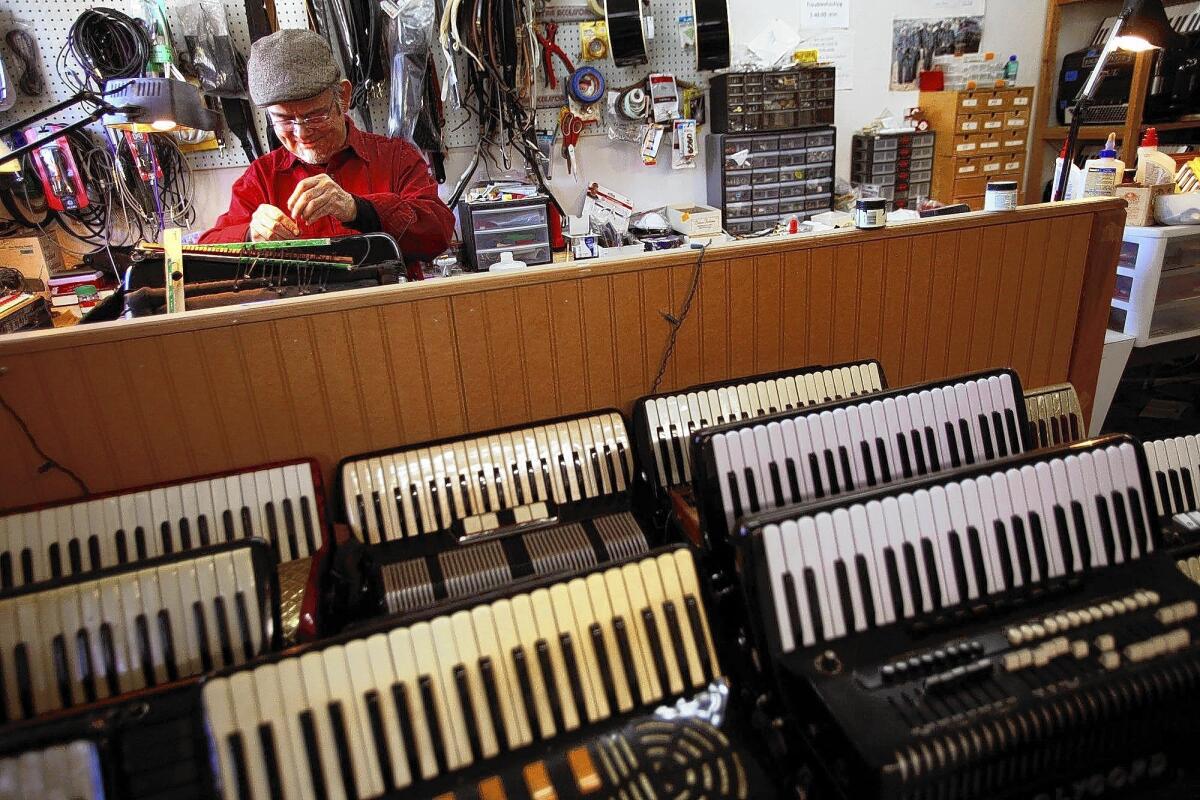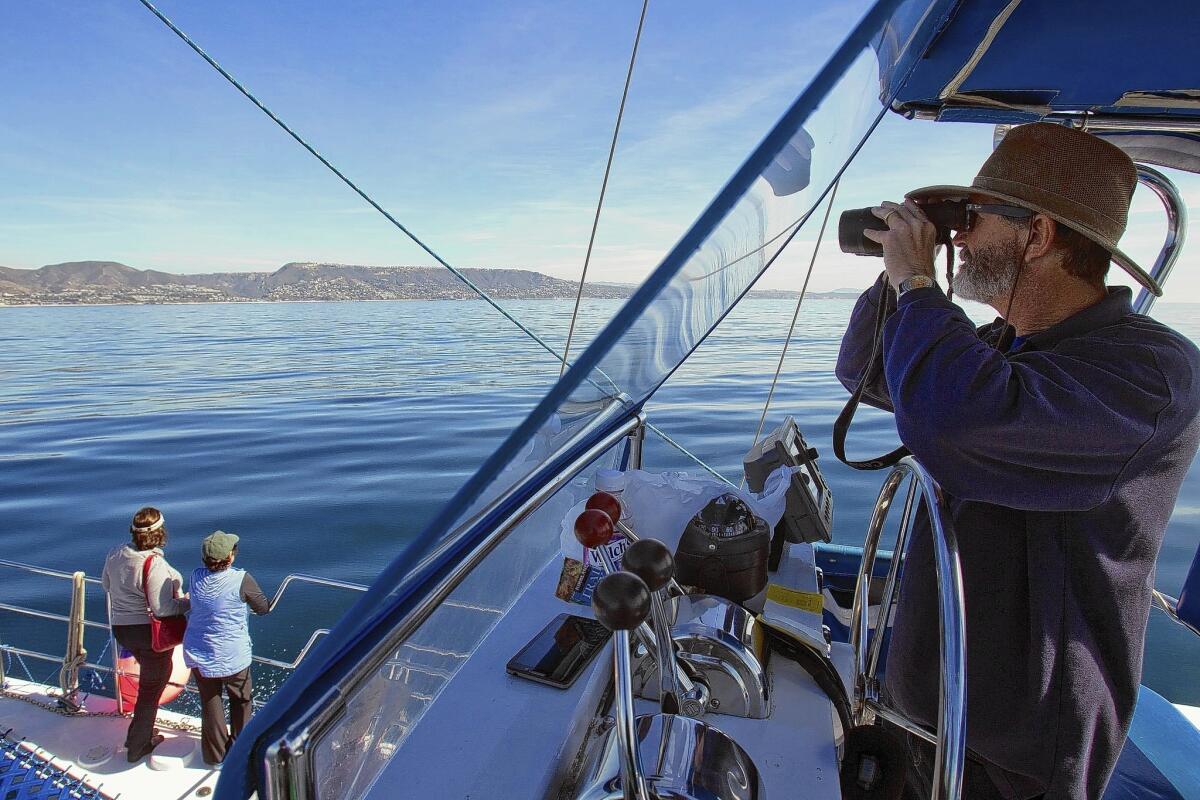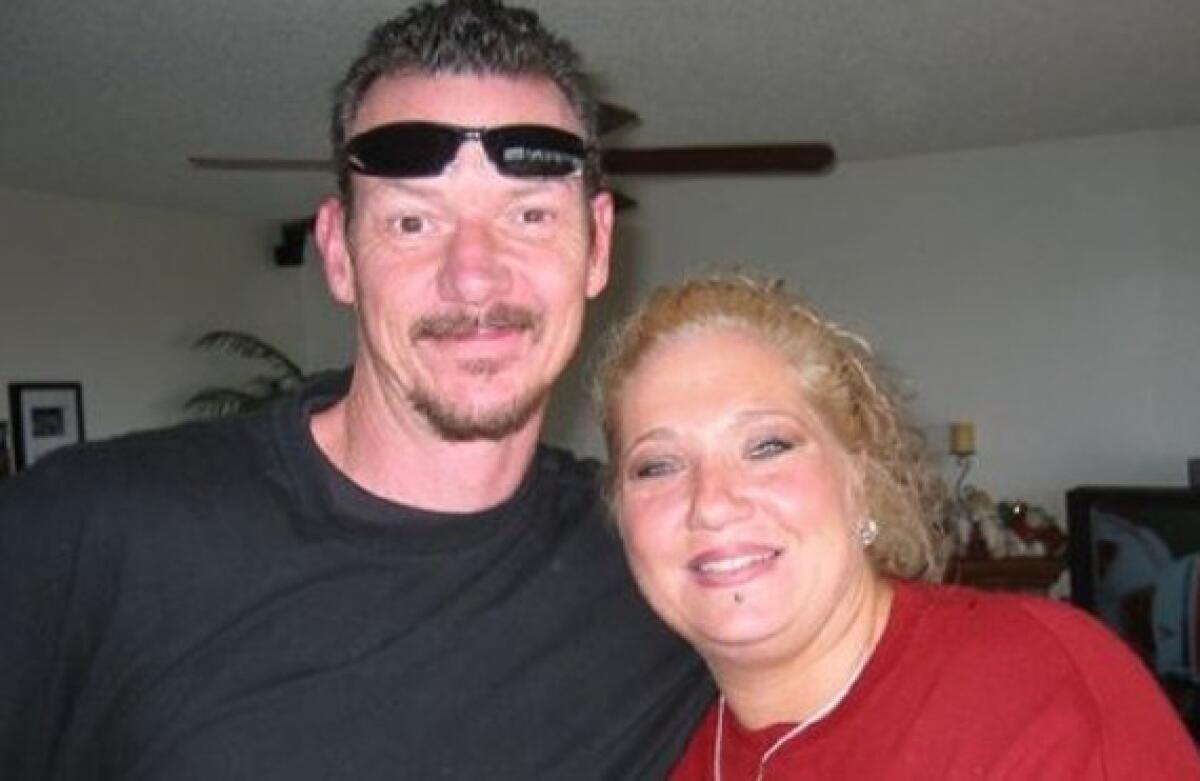More fans of the accordion are squeezing in lessons
Once the butt of jokes, the instrument is making a comeback thanks in part to its adoption by influential musicians and bands.
Across the street from a wine lounge and a gourmet sausage spot on Glendale Boulevard in Atwater Village, a small red-and-white neon sign reads: "DAVE'S ACCORDION SCHOOL."
Inside, black and tan cases sprawl in a row along the floor, and two shelves hold a hodgepodge of squeezeboxes for sale. Business cards of norteño stars blanket a corkboard near the door, and nearby there's a printout of the dictionary's definition of the word "accordion," with a suggested alternative: "A fantastic companion."
Owner Dave Caballero, 68, sat on a piano bench examining the innards of a brown accordion. Down a narrow hallway, in a room decorated with an old blue couch and a figurine of Andy from "Toy Story," his wife, Veronika, was finishing up her session with Emily Gaughenbaugh.
The 92-year-old said she took up the instrument a couple of months ago, in part because it beats doing crossword puzzles. She packed up her small red accordion and walked back into the shop's storefront, where a signed picture of the Irish band the Pogues hangs on the wall next to one from Weird Al Yankovic that reads: "DAVE — Thanks for everything.... And don't forget to eat your broccoli! Weird Al."
As Gaughenbaugh waited for her 66-year-old daughter to finish her guitar lesson in another room, she watched a man with graying hair finish his lesson, her slim shoulders swaying to the melody from the French film "The Umbrellas of Cherbourg." Soon a twenty-something with a pixie haircut and a young Russian boy showed up for their lessons.
"Accordion is coming back," Gaughenbaugh said, smiling. "For a while it was kind of a joke."

Back in the '60s, '70s and '80s, Los Angeles had a well-established accordion ecosystem. Door-to-door salesmen recruited students for lessons, dozens of schools sustained them and an annual competition drew thousands of accordion students from all over the country who tried to outperform each other on "Bing Bang Polka" and "Yankee Doodle Rag."
One of those salesmen knocked on the front door of a Lynwood home almost 50 years ago and gave the couple there his pitch: I'd like to teach your son to play the guitar, or maybe the piano accordion. The couple picked the latter, and on the day before his 7th birthday, little Alfred Matthew Yankovic had his first lesson.
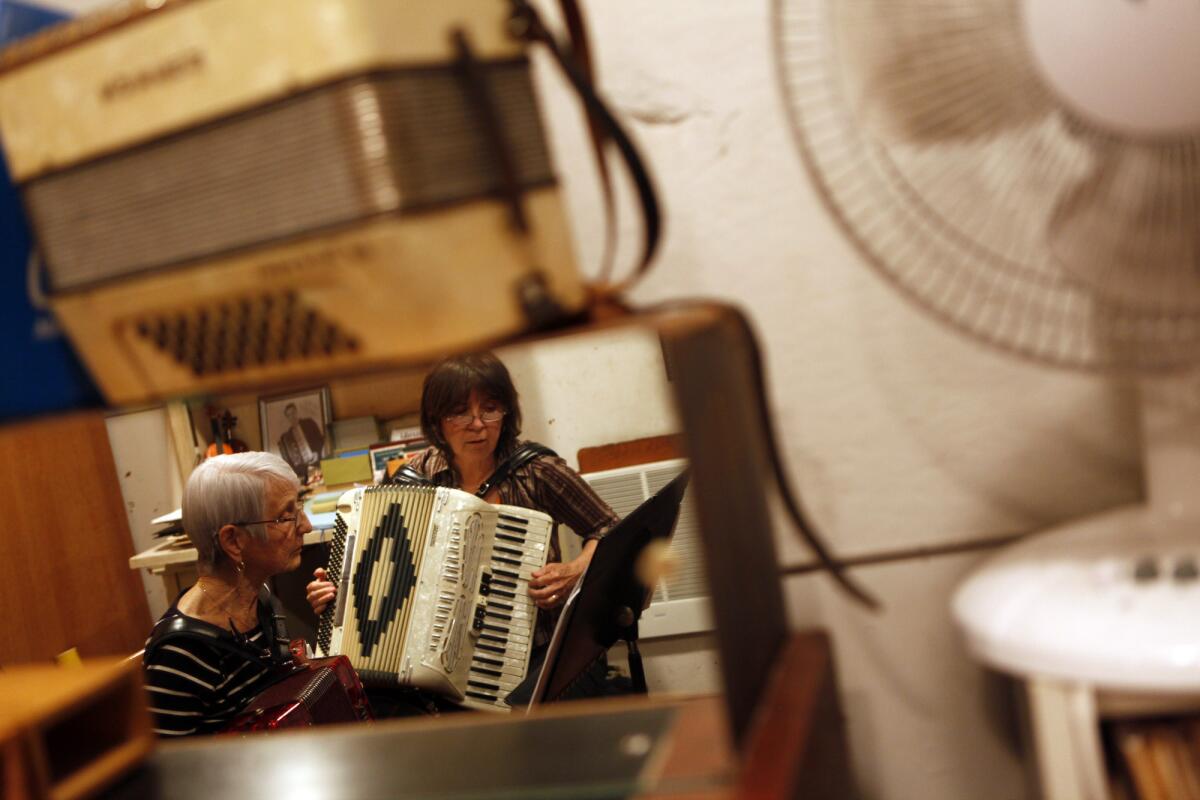
Veronika Caballero, right, wife of owner Dave Caballero, teaches Emily Gaughenbaugh, 92, how to play the accordion while caught in a reflection at Dave's Accordion School in Atwater Village. Gaughenbaugh said she took up the instrument a couple of months ago, in part because it beats doing crossword puzzles. More photos
Before long, the boy better known now as Weird Al had figured out the bellow box's push and pull — and what people thought of it.
"The accordion got a reputation of being kind of unhip," Yankovic said with a laugh that acknowledged he's stating the obvious.
But now the equation has flipped.
Thanks in part to its adoption by influential musicians and bands, such as Tom Waits, Gogol Bordello and Mumford & Sons, its role in the whimsical film cult classic "Amelie" and a general trend of branding the once-weird as hip, the accordion has a new reputation: quirky, modish even.
French singer and accordionist Jessica Fichot — Ms. May in a pinup-style calendar called "Accordion Babes" hanging at Dave's shop — said she noticed the instrument's wave of trendiness eight years ago or so after she graduated from Boston's Berklee College of Music and moved to L.A.
Fichot kept hearing the push-and-pull of the bellows in the background of a lot of new music and decided to add an accordionist to her band. But she didn't have any luck finding somebody, so she went to EBay, bought one for $30 and taught herself.
"I think I was part of this new thing," she said. "Acoustic music … was becoming a little bit hip, and I think the accordion was part of that."
Yankovic said he first noticed the reputation shift about a decade ago and quipped that he probably had something to do with it.
"I like to think that I've helped to bring sexy back to the accordion," he said, laughing.

But in certain pockets of L.A.'s accordion culture, sexiness was never a struggle.
Among Latino aficionados of the diatonic button accordion — the type mastered by conjunto and norteño greats like Flaco Jiménez and Ramón Ayala and newcomers like La Santa Cecilia — the instrument was not only never a joke but actually quite revered.
Button accordionist Otoño Luján — whose father, Gilbert "Magú" Luján, helped pioneer the Chicano art movement — never thought of the instrument as weird or embarrassing.
"It doesn't have the same kind of stigma of being nerdy," said Luján, who teaches button accordion lessons and plays one in the band Conjunto Los Pochos. (When people ask about piano accordion, he sends them to Dave's for lessons.)
"It's a very simple music," he said. "But it's got a soul to it that really pulled me in."
Although he's trained on the button style, Luján loves all accordions.
"There's all these different flavors," he said. "But the unifying element is … the ability to control this dynamic with the bellows that almost mirrors human speech."
Yankovic said he was struck with how mainstream the accordion is in other cultures a few years ago when he watched a Colombian film called "The Wind Journeys," which he described as " '8 Mile,' but with an accordion."
"It was all very macho and intense," he said. "It didn't seem out of place or jokey."

Local squeezebox star Gee Rabe likens visiting Dave Caballero's shop to stepping into the world that she too was recruited into by a door-to-door salesman.
For years after her first private lesson in 1975, Rabe spent four days every summer at a hotel near Los Angeles International Airport for a music festival sponsored by the Accordion Federation of North America. She still has festival programs from the '70s that list more than 25 L.A.-area shops that taught accordion lessons.
I like to think that I've helped to bring sexy back to the accordion.”— Weird Al Yankovic
The accordion was a huge part of her life growing up, but Rabe said she almost never talked about it — she knew better. She'd seen the popular bumper sticker proclaiming that anyone who played the instrument should go to jail, and there was the "Far Side" comic that mused that if heaven handed out harps, hell must have accordions.
Rabe, who teaches world music at Cal State Northridge and performs with the Grammy-nominated Cajun music group Lisa Haley & the Zydekats, credits the Internet and freer access to different accordion music styles — not just "the older Italian man playing some old Italian song" — with the reputation shift.
Although Caballero, who opened his shop in 1971, has always thought of the accordion as cool, he said many of his new students list specific musicians or "Amelie" as their inspiration. Some say they like the portability of the instrument and others are intrigued by it but not sure why.
"I think it's just the general curiosity," he said. "People just love the tone of the accordion."
And if the number of repairs he's doing is any indication, the accordion is more popular than ever. People from Tahiti and Hawaii have shipped their instruments to Dave's to have them fixed, and even with three part-time helpers, it's tough to get to them all.
"We're inundated all the time," Caballero said. "We can never catch up."

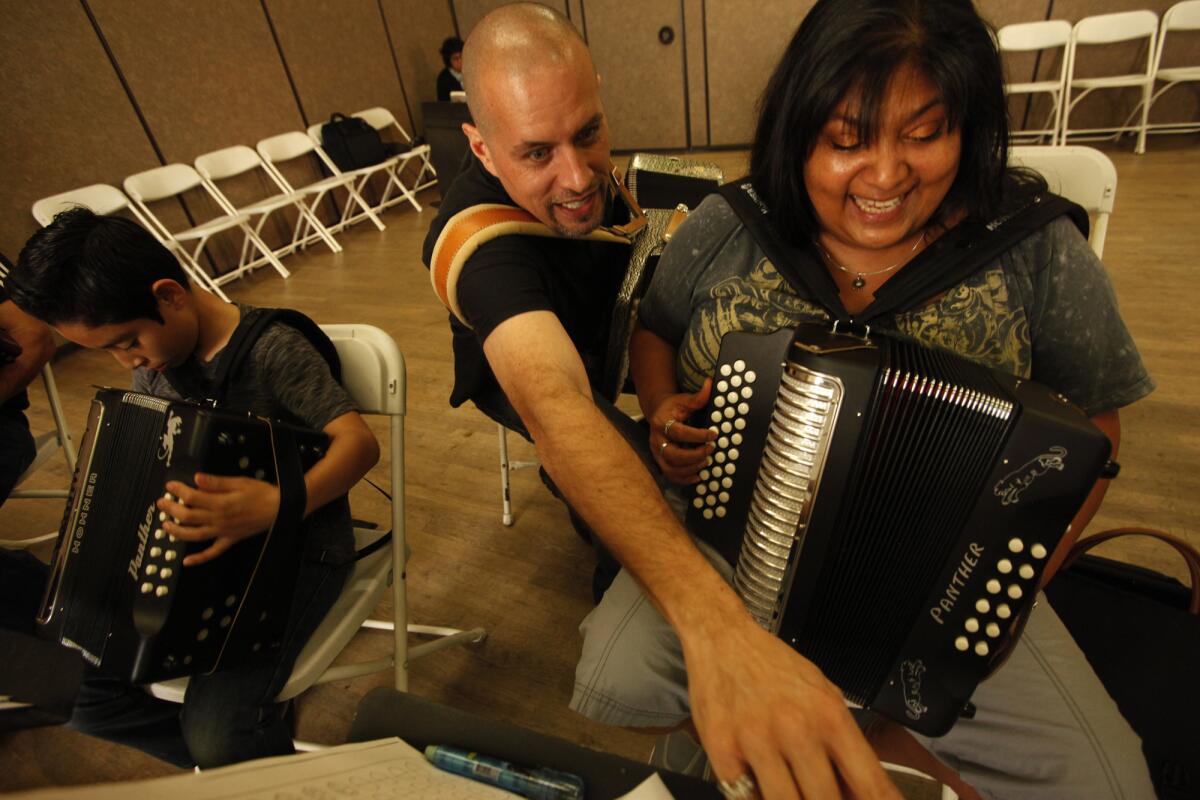
Otono Lujan helps student Sylvia Gonzales with a new song while teaching his weekly Saturday morning class on playing the button accordion. Lujan, who plays in a band called Conjunto Los Pochos, has been teaching students how to play the accordion for many years. More photos
People lugging accordion cases streamed into a room at Plaza de La Raza in Lincoln Heights on a recent Saturday morning. They settled into folding chairs and watched as Luján scrawled their options for that day's lesson onto a white board: "Las Mañanitas, Cotulla Polka, Los Dos Amigos, Volver Volver."
Jason Sanchez, 10, picked a spot in the front row. He unpacked his small tricolored accordion — the red, green and white of the Mexican flag — and a copy of a song by his favorite band, Los Alegres del Barranco.
As his arm extended to the side, the bellow expanded and sound began to escape. He sighed and his brow scrunched into a severe expression that contrasted with his blue T-shirt that read, "Chill out bro. It's nacho fault."
He tried again. His feet began to swing back and forth to the tempo and a small smile cracked his round face.
He was one lesson closer to performing a corrido like Los Alegres del Barranco.
Follow Marisa Gerber (@marisagerber) on Twitter
Follow @latgreatreads on Twitter
More great reads
Rose Hills cemetery cultivates Chinese clientele
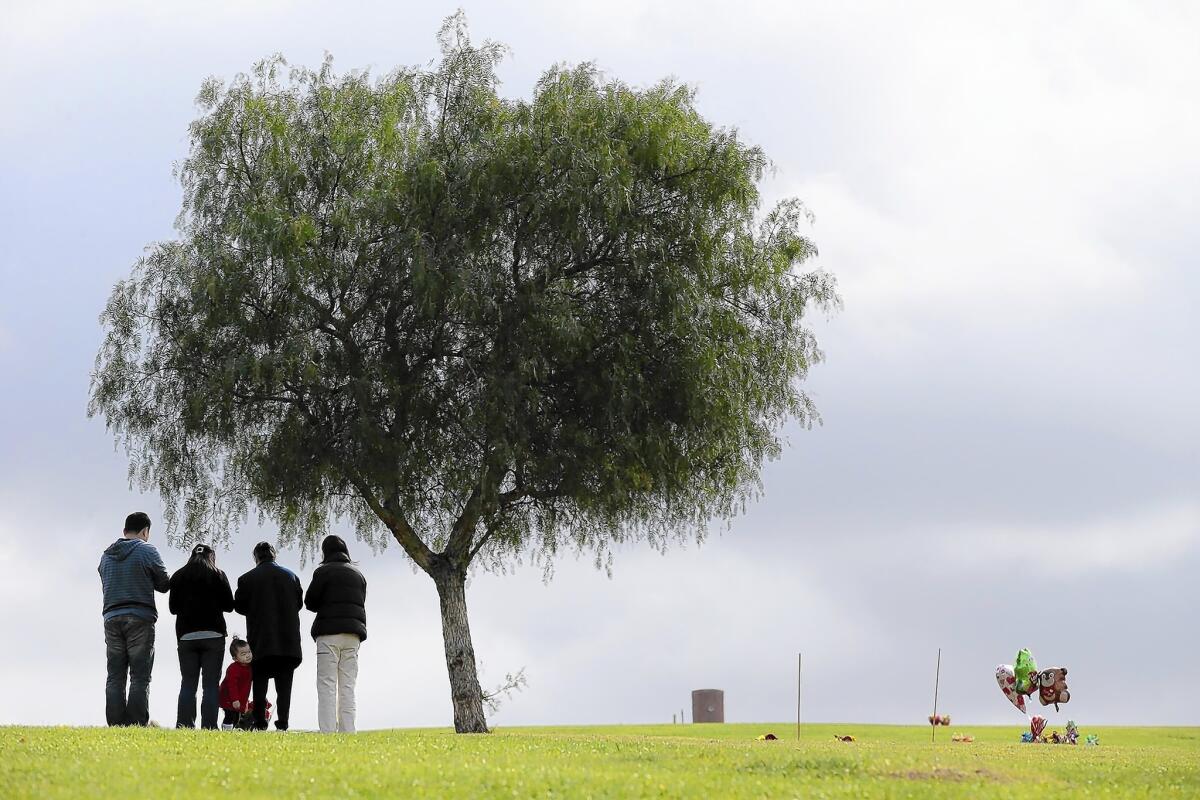
Sign up for Essential California
The most important California stories and recommendations in your inbox every morning.
You may occasionally receive promotional content from the Los Angeles Times.
